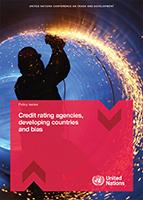
This policy review explores the significant differences in the distribution of sovereign credit ratings between developed and developing countries and seeks to determine whether they are merely a reflection of higher probabilities of default, or whether they reflect biases against developing countries.
It finds that subjective indicators, judgements, and sentiment play an important role in determining the rating opinions of rating agencies, and that this creates significant scope for bias. Several studies have identified various types of ratings bias that have historically tended to work against the interests of developing countries. However, systemic and consistent ratings bias can be hard to prove and may be overshadowed by other forms of bias that are innate to the current global financial architecture.
Variances in the yield spreads between developed and developing countries with the same credit ratings indicate that participants in global capital markets take account of much more than ratings. Ratings also assume less importance when countries adopt high quality, and transparent data and debt management systems and establish accountable and effective institutions. Improved transparency assists financial markets to assess country conditions independently, and reduces reliance on credit ratings in the process.
The review concludes that focusing policy efforts on addressing perceived ratings biases may not be the most constructive way forward and explores alternative policy approaches, including the potential for a United Nations technical assistance process focused on developing countries that do not currently have sovereign ratings.


